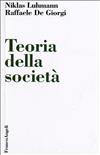
The Risk of Risk Society and the Limits of Law - What is represented as risk in the risk society? Does this question concern the operations of society’s structure, or does it concern the semantics through which society observes itself? And finally, can law reduce risk, or is it a risk-factor in itself? The theoretical perspective proposed in this essay is the one offered by Luhmann’s theory of society. Indeed, only this perspective enables us to deconstruct current representations of risk and the legal system and to advance a description more attuned to the complexity of modern society. The article’s main hypothesis is that risk is a structural feature of modern society’s complexity. Risk is built in the process of temporalisation of modern society, in its symbiosis with the future, in the paradoxical nature of the present, and in the ecology of non-knowledge. Both risk and law are techniques aimed at constraining time while reducing uncertainty and non-knowledge about the future. Modern society treats the future as a risk that depends on decisions. In turn, modern law’s self-recognition relies upon its capacity to control risk. However, the author argues that this process is highly problematic and risky. In fact, law cannot forbid, stop, or prevent risk: it can only resort to strategies aimed at reducing the riskiness of the juridical treatment of risk.


